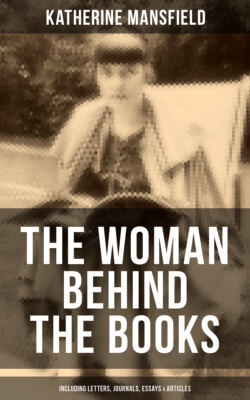Читать книгу Katherine Mansfield, The Woman Behind The Books (Including Letters, Journals, Essays & Articles) - Katherine Mansfield - Страница 114
На сайте Литреса книга снята с продажи.
Saturday — May 22, 1915 —
ОглавлениеTable of Contents
Saturday
May 22, 1915
To J. M. Murry
I DON'T know how money goes. I keep a strict account (one of those amazing fourfold affairs in which we are so expert) and every penny is reckoned, and yet, it seems to fly. A franc in Paris is really 8d. in England just now. But don't think I am complaining, because I am not—merely stating my case—and I know my money will come next week. I have asked them to send it through Cook's. It is the simplest way, and really the post-offices are merely a collection of stools and stamp-paper. Yesterday, after I had nearly cried through a grating about my lost letter, the man suggested brightly, cleaning his nails on an old nib, “Perhaps the postman threw it away! …”
I wanted to tell you about a nice time I had on Thursday night. At about seven I left the house, buttoned up in my black and white coat and went for a walk behind the Hotel de Ville. I found most curious places, and I found at last a little market place where every third body was either frying or eating Polish pancakes. The air smelled of them and of ‘petits gris,’ tiny snails which you bought by the shovelful. It began to rain. Under an old stone arch three hags wrapped in black shawls were standing, their hands crossed over their bellies. At their feet there lay three little baskets of herbs, dry twigs, withered bundles and tiny packets. Their heads were raised, watching the drizzle, and the green light from a lantern fell on their faces. All of them were talking, whether to each other or to themselves you could not tell, for their voices did not pause. It sounded like a song. It was one of the most ancient things I have ever seen or heard.
I had to go into one of those little 10 c. places. In the passage stood an immense fat and rosy old market woman, her skirts breast high, tucking her chemise into her flannel drawers, and talking to an equally fat old ouvrier, who began to help her to arrange her affairs, saying as he tugged and buttoned, “Mais tu sais, ma petite, tu ne peux pas sortir comme ca.”
I went on much further—then down an alley on to a quai. There was a bird shop there. The window was flying with canaries and java sparrows and green love-birds and white doves and parrots. Outside the shop two little girls were standing, their arms round each other's necks. One had rings in her ears and the other wore a bangle. They were watching the birds and eating an orange between them, quarter by quarter. The bird-seller was a dark young man with long black moustaches and narrow eyes…. I don't know why, but I had a curious sensation that I was in a dream and that I had seen all this years and ages ago.
Finally, it poured so with rain that I hunted and I hollered and found a café—very poor—the people eating, chauffeurs and rag bags of people. But a woman came in, skinny, enceinte, but very alive, and a curious rough boy followed her. They were so wet that the woman said “faut danser.” And they danced. As far as I could make out this is what they sang as they turned round and round. The people who ate banged with their bread on the table and the plates clattered.
S'il en reste un bout, ce sera pour la servante.
S'il en reste pas du tout, elle se tapera sur l'ventre.
Et zon zon zon Lisette, ma Lisette.
Et zon zon zon Lisette, ma Lison.
All the while my hat dripped over the table. I kept taking it off and shaking it on the floor. But when the boy was greeted by a very smart young friend who came to my table and said “Je veux manger une belle fricassée avec vous, ma fleur,” I paid and ran away.
